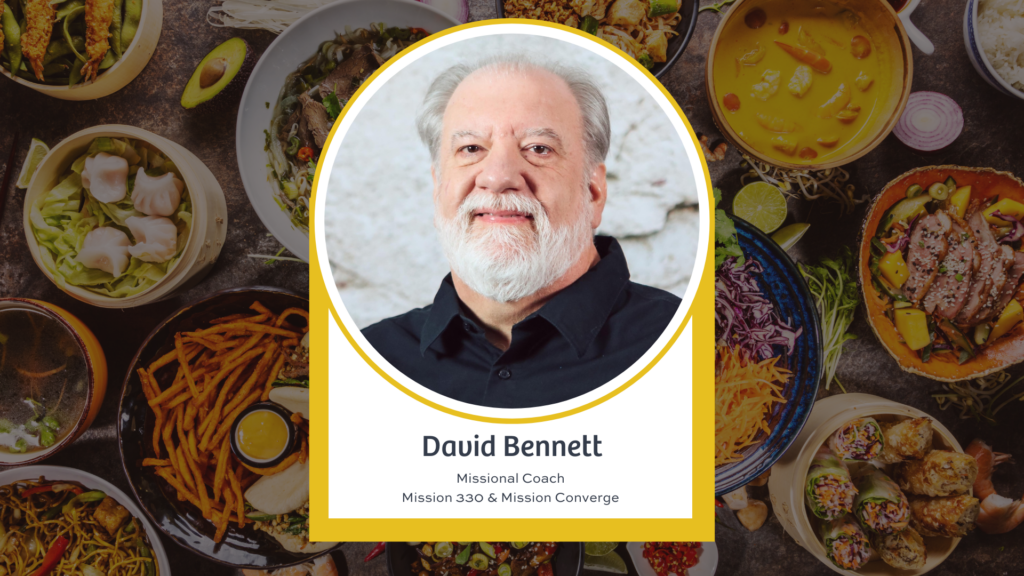Three Ways to Learn
Listen
Watch
Show Notes
Even in the most robust churches, leaders can find themselves disheartened, feeling like their efforts to share the Gospel aren’t making a real impact. The excitement and connection they long to see in their congregations just aren’t there.
But what if the answer is as simple as gathering people around a table? In this episode, we talk with David Bennett, a coach for pastors who are ready to try something different. David shares how the simple act of sharing a meal can transform not only churches but entire neighborhoods. Learn how Dinner Churches are helping leaders bring their communities together, sparking genuine conversations and deeper connections.
David Bennett is passionate about helping churches engage their communities in a fresh, meaningful way. As the leader of Mission 330 and Mission Converge, he works to equip pastors to build genuine relationships in a post-Christian world. Serving as a U.S. missionary with the Assemblies of God, David focuses on the power of good neighboring and the transformative impact of “table theology” on local ministries.
Help us spread the word about the Dinner Church podcast by subscribing and leaving us reviews on Apple Podcasts, Spotify, YouTube or wherever you enjoy your podcasts.

Related Resources:
Email us: podcasts@freshexpressions.com
Interview Summary
“Knowing people, reaching people, touching real lives was far more important than any sort of brand or image that we could put out across the whole city.” – David Bennett
In a compelling interview on the Dinner Church podcast, David Bennett shares profound insights into shifting church ministry from a broad regional focus to a deeply local, neighborhood-centric approach. Hosted by Verlon Fosner, director of the Dinner Church Collective and a seasoned pastor, the discussion explores the transformative journey of ministry that prioritizes genuine community connections over expansive reach.
David Bennett, a seasoned church leader with significant influence in Ohio and the central United States, brings a rich background in transitioning from traditional church roles to innovative, local ministry models. His experiences provide valuable lessons for church leaders looking to deepen their impact in their immediate communities.
The Shift to Neighborhood-centric Ministry
David Bennett articulates the necessity of focusing on local, neighborhood-centric ministry rather than broad, regional outreach.
“The hardest thing was shifting inside my head, the way I needed to think about things.”
This mindset shift is crucial for fostering more intimate and meaningful community engagements. He further explains the importance of localizing ministry to a community or neighborhood, emphasizing the need to “think more localized,” which allows for a more tailored and effective approach to ministry.
Challenges of Downsizing Ambitions
The emotional and logistical challenges of reducing the scale of ministry operations are significant. David discusses the internal struggle of perceiving this change as a demotion but emphasizes the deeper value found in smaller settings: “Knowing people, reaching people, touching real lives was far more important than any sort of brand or image.” He stresses the importance of aligning ministry efforts with personal and direct interactions, which often lead to a more profound spiritual impact than larger, impersonal initiatives.
Impact of Personal Connections
Highlighting the effectiveness of personal connections, David recounts an experience where a simple act of kindness—delivering a fruit basket to a neighbor—had a profound impact on community relations and individual faith.
“When you start knowing the face and the name…that just really changes the way you use the resources that you have.”
David underscores the power of small, thoughtful gestures in building relationships and fostering a sense of community and belonging within the local church environment.
The Role of Dinner Churches
Verlon Fosner introduces dinner churches as a key element of the interview, describing them as “affordable, simple, and very effective at evangelism.” This model emphasizes the importance of meal-sharing as a form of church, facilitating spiritual and communal growth through intimate, table-centered gatherings, thus embodying the ancient Christian practice of communal meals. Fosner notes the increasing popularity of this model across different denominational and geographical contexts, demonstrating its adaptability and effectiveness in various community settings.
The core message from David Bennett’s interview is clear: true ministry success isn’t measured by the size of the congregation but by the depth of relationships formed within the community. This neighborhood-centric approach might require rethinking traditional measures of success, but it promises a more sustainable and impactful ministry aligned with the teachings of Jesus about neighborly love.
Reflection Questions
- How can your church shift focus from quantity of members to quality of relationships?
- What are practical steps you can take to foster a neighborhood-centric ministry model?
- How might you handle the emotional and logistical challenges of downsizing your ministry’s scope?
- In what ways can dinner churches or similar models be implemented in your community?
- What barriers exist in your current ministry model that prevent deeper community engagement?
- How can personal connections redefine success in your ministry efforts?

